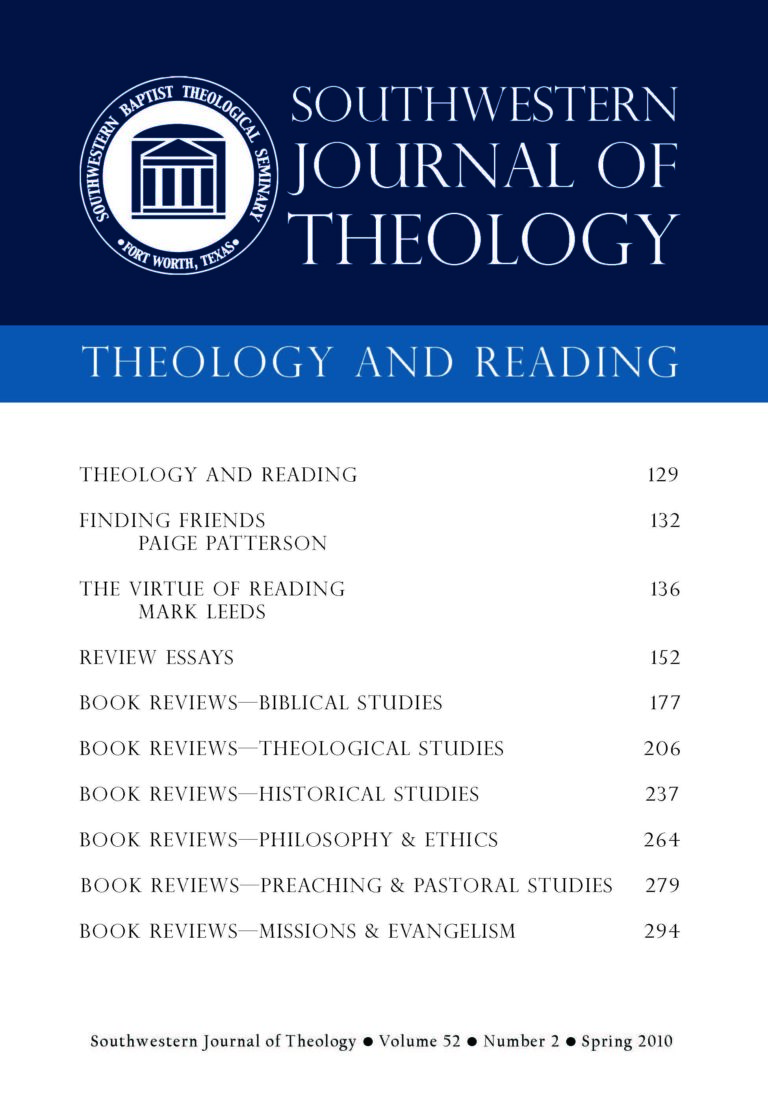
Theology and Reading
Southwestern Journal of Theology
Volume 52, No. 2 – Spring 2010
Managing Editor: Malcolm B. Yarnell III
By Susan Niditch. The Old Testament Library. Louisville: Westminster John Knox Press, 2008. 290 Pages. Hardcover. $44.95.
Part of the intrigue and richness of God’s Word is found in its narratives. The authors of Scripture deftly relate events from the lives of God’s people that speak of God’s love and faithfulness as well as mankind’s struggles and victories. Susan Niditch in her new commentary on Judges has focused much of her attention on the stories of the text and attempts to convey their lessons as well as lasting significance. Part of her focus was to highlight the roles of women in the text from a unique perspective. That may be her strongest accomplishment.
On the inside flap, the editors of the Old Testament Library series have commented on their “well-earned reputation for judicious commentaries that explain in a highly readable format the most significant, literary, and theological features of the biblical text.” Overall, this commentary appears to satisfy only part of that prescribed standard. Regrettably, though the work is readable, the exegetical section scratches many surfaces of the biblical text, but explores few in depth.
The bibliography for the commentary is dated and appears selective. The citations in the text are well-documented, yet excessively refer to the author’s own works. The textual notes following the translation in the body are interesting, but rely overwhelmingly, as the author stipulates (25), on the Old Latin version and the Vaticanus manuscript of the Septuagint. The organization of the work is, at times, awkward. In the introduction, the headings do not flow logically and occasionally seem to confuse headings with sub-headings. In the body of the commentary, headings are only used to mark new chapters.
The major part of the book is based around two separate translations of Judges. One translation is included in the body and another is listed in the appendix. Niditch suggests that the first translation follows an English word order, while the one in the appendix, which is described as “a literal translation of Judges” (213), follows Hebrew. The quality of her translation is good and shows evidence of the decade of labor she invested in it (ix). However, when comparing the two translations, one wonders the rationale behind listing them both as they are virtually identical. The two translations, which together comprise over sixty percent of the volume of the commentary, are so similar that the infrequent word order changes fail to justify the space allotted to a separate translation.
Moreover, although the second translation is described as “literal,” often in her textual notes, she lists what she describes is a “literal” translation of a word or phrase which does not ever seem to be reflected in her “literal” translation. In a random selection of ten such occurrences of “literal” translations from the textual notes, not one of them was translated that way in her “literal” translation, causing confusion as to the purpose of the “literal” translation.
Ultimately, the work seems unclear on its intended audience. The style is formal as though written for an academic context, with the exception of numerous colloquial word choices that appear to be used to appeal to a less formal audience. She accepts that variant and even contradictory narratives are included and “embraced” (22) in the text and insists that her translation is intended to help distinguish between the various traditions (25). Nevertheless, she comments that she does not believe one can “recover an original version [of the text of the book of Judges], if there is such a thing” (23).
Ironically, Niditch may have accomplished her stated goal in this work, which was to “capture both the meaning and the message of the Hebrew” (26). For this purpose, that goal perhaps should have been more rigid. Some settings may benefit from her translation and comments; however, as a whole, the commentary will likely leave serious students under-fed.





